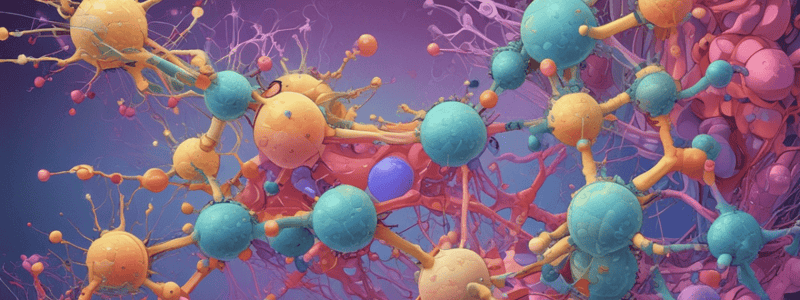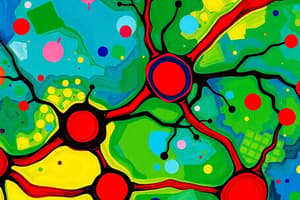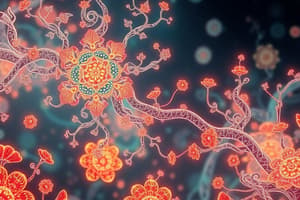Podcast
Questions and Answers
What is the role of tyrosine kinases in cellular processes?
What is the role of tyrosine kinases in cellular processes?
Regulating various cellular processes, including cell growth, proliferation, differentiation, and survival.
How are Receptor Tyrosine Kinases (RTKs) activated?
How are Receptor Tyrosine Kinases (RTKs) activated?
Upon binding of specific ligands, RTKs undergo dimerization and autophosphorylation.
What is the function of Non-Receptor Tyrosine Kinases?
What is the function of Non-Receptor Tyrosine Kinases?
Mediating the transmission of signals from cell surface receptors to the nucleus.
Describe the structure of Receptor Tyrosine Kinases (RTKs).
Describe the structure of Receptor Tyrosine Kinases (RTKs).
How do activated RTKs initiate intracellular signaling cascades?
How do activated RTKs initiate intracellular signaling cascades?
Give examples of Non-Receptor Tyrosine Kinases.
Give examples of Non-Receptor Tyrosine Kinases.
What is the significance of autophosphorylation in RTK activation?
What is the significance of autophosphorylation in RTK activation?
What is the main consequence of mutations or overexpression of tyrosine kinases?
What is the main consequence of mutations or overexpression of tyrosine kinases?
How do tyrosine kinase inhibitors (TKIs) interfere with oncogenic signaling pathways?
How do tyrosine kinase inhibitors (TKIs) interfere with oncogenic signaling pathways?
What is the role of phosphorylation in cellular signal transduction?
What is the role of phosphorylation in cellular signal transduction?
How do receptor tyrosine kinases (RTKs) initiate downstream signaling cascades?
How do receptor tyrosine kinases (RTKs) initiate downstream signaling cascades?
What are the activation mechanisms of non-receptor tyrosine kinases?
What are the activation mechanisms of non-receptor tyrosine kinases?
Describe the process by which ligand binding activates receptor tyrosine kinases (RTKs).
Describe the process by which ligand binding activates receptor tyrosine kinases (RTKs).
What downstream signaling proteins are recruited by activated RTKs?
What downstream signaling proteins are recruited by activated RTKs?
How do non-receptor tyrosine kinases like Src family kinases become activated?
How do non-receptor tyrosine kinases like Src family kinases become activated?



